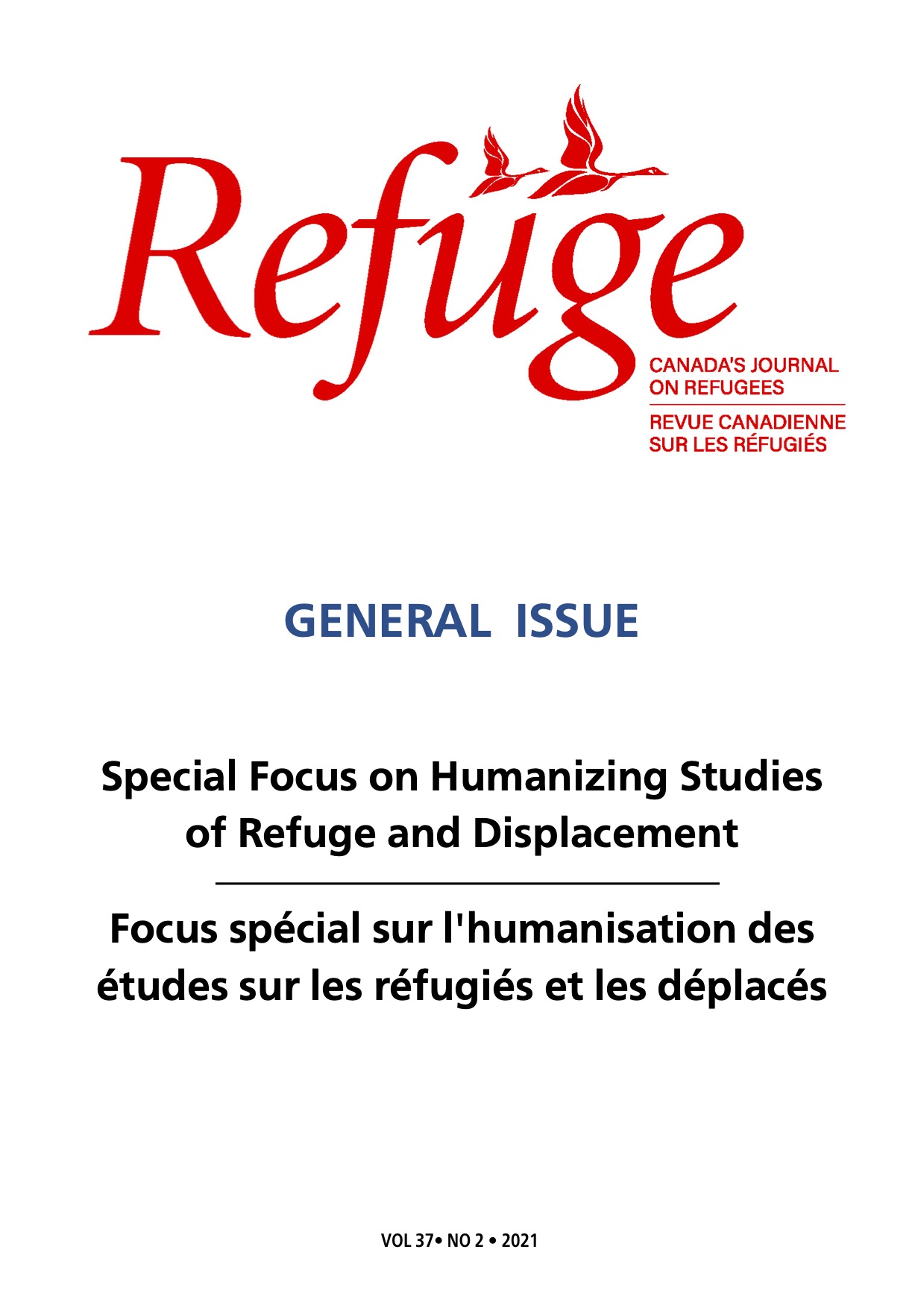On Refugee Agency, Bio-Politics, and a New World
DOI:
https://doi.org/10.25071/1920-7336.40794Keywords:
flesh, bare life, refugee studies, refugee camps, biopolitics, settler colonialismAbstract
This short intervention starts by discussing Giorgio Agamben’s theoretical formulation of ‘bare life,’ popular in refugee studies. Thinking with the case study of Palestinian refugee camps, particularly in the West Bank, it argues that there are clear limitations to the discourse of and bare life. I argue that ‘bare life’ neither accounts for the multilayered relations of power, particularly colonialism, slavery, and indigenous genocide, that systemically make certain populations more susceptible to its power than others. Nor does it account for the modes of of those who are systemically relegated to its sphere. I conclude by working through some of the theoretical formulations around body politics from the field of Black studies, particularly Alexander Weheliye's 2014 concept of the flesh, in order to explore new directions they may point us towards in refugee studies.
Metrics
References
Abourahme, N. (2015). Assembling and spilling-over: Towards an “ethnography of cement” in a Palestinian refugee camp. International Journal of Urban and Regional Research, 39(2), 200–217. https://doi.org/10.1111/1468-2427.12155 DOI: https://doi.org/10.1111/1468-2427.12155
Agamben, G. (1998). Homo sacer: Sovereign power and bare life (D. H. Roazen, Trans.). Stanford University Press.
Ahmad, A. (1994). In theory: Classes, nations, literatures. Verso.
Baraka, A. (1995). Blues people. Payback.
Betts, A., & Bloom, L. (2014). Humanitarian innovation: The state of the art. United Nations Office for the Coordination of Humanitarian Affairs. https://www.unocha.org/publication/policy-briefs-studies/humanitarian-innovation-state-art
Chatty, D. (2017). The duty to be generous (karam): Alternatives to rights-based asylum in the Middle East. Journal of the British Academy, 5, 177–199. https://doi.org/10.5871/jba/005.177 DOI: https://doi.org/10.5871/jba/005.177
Chimni, B. S. (1998). The geopolitics of refugee studies: A view from the South. Journal of Refugee Studies, 11(4), 350–374. https://doi.org/10.1093/jrs/11.4.350-a DOI: https://doi.org/10.1093/jrs/11.4.350
Foucault, M. (1988). The history of sexuality. Vintage.
Hanafi, S. (2013). Explaining spacio-cide in the Palestinian territory: Colonization, separation, and state of exception. Current Sociology, 61(2), 190–205. https://doi.org/10.1177/0011392112456505 DOI: https://doi.org/10.1177/0011392112456505
Hanafi, S., & Long, T. (2010). Governance, governmentalities, and the state of exception in the Palestinian refugee camps of Lebanon. Journal of Refugee Studies, 23(2), 134–159. https://doi.org/10.1093/jrs/feq014 DOI: https://doi.org/10.1093/jrs/feq014
Harney, S., & Moten, F. (2013). The undercommons: Fugitive planning & Black study. Minor Compositions.
Henni, S. (2017). Architecture of counterrevolution: The French army in Northern Algeria. Gta Verlag. DOI: https://doi.org/10.4000/abe.3105
Lentin, R. (Ed.). (2008). Thinking Palestine. Zed Books. DOI: https://doi.org/10.5040/9781350223646
Malkki, L. H. (1995). Purity and exile: Violence, memory and national cosmology among Hutu refugees in Tanzania. University of Chicago Press. DOI: https://doi.org/10.7208/chicago/9780226190969.001.0001
Mayblin, L. (2014). Colonialism, decolonisation, and the right to be human: Britain and the 1951 Geneva Convention on the Status of Refugees. Journal of Historical Sociology, 27(3), 423–441. https://doi.org/10.1111/johs.12053 DOI: https://doi.org/10.1111/johs.12053
Minco, C., Rijke, A., Pallister-Wilkins, P., Tazzioli, M., Vigneswaran, D., van Houtum, H., & van Uden, A. (2021). Rethinking the biopolitical: Borders, refugees, mobilities…. Environment and Planning C: Politics and Space.Advance online publication. . https://doi.org/10.1177/2399654420981389 DOI: https://doi.org/10.1177/2399654420981389
Oliver, K. (2017). Carceral humanitarianism: Logics of refugee detention. University of Minnesota Press. DOI: https://doi.org/10.5749/9781452958507
Polzer, T. (2009). Negotiating rights: The politics of local integration. Refuge: Canada’s Journal on Refugees, 26(2), 92–106. https://doi.org/10.25071/1920-7336.32081 DOI: https://doi.org/10.25071/1920-7336.32081
Ramadan, A., & Fregonese, S. (2017). Hybrid sovereignty and the state of exception in the Palestinian refugee camps in Lebanon. Annals of the American Association of Geographers, 107(4), 949–963. https://doi.org/10.1080/24694452.2016.1270189 DOI: https://doi.org/10.1080/24694452.2016.1270189
Robinson, C. J. (2000). Black Marxism: The making of the Black radical tradition. University of North Carolina Press.
Said, E. W. (1983). The world, the text, and the critic. Harvard University Press.
Salamanca, O. J., Qato, M., Rabie, K., & Samour, S. (2012). Past is present: Settler colonialism in Palestine. Settler Colonial Studies, 2(1), 1–8. https://doi.org/10.1080/2201473X.2012.10648823 DOI: https://doi.org/10.1080/2201473X.2012.10648823
Salih, R. (2013). From Bare Lives to Political Agents: Palestinian Refugees as Avant-Garde. Refugee Survey Quarterly, 32(2), 66–91. https://doi.org/10.1093/rsq/hdt005 DOI: https://doi.org/10.1093/rsq/hdt005
Schmitt, C. (2005). Political theology: Four chapters on the concept of sovereignty. University of Chicago Press. DOI: https://doi.org/10.7208/chicago/9780226738901.001.0001
Smith, M. (2004). Warehousing refugees: A denial of rights, a waste of humanity. World Refugee Survey, 44. https://sswm.info/sites/default/files/reference_attachments/SMITH%202004%20Warehousing%20Refugees.pdf
Ticktin, M. I. (2011). Casualties of care: Immigration and the politics of humanitarianism in France. University of California Press. DOI: https://doi.org/10.1525/9780520950535
Tuastad, D. (2017). ‘State of exception’ or ‘state in exile’? The fallacy of appropriating Agamben on Palestinian refugee camps. Third World Quarterly, 38(9), 2159–2170. https://doi.org/10.1080/01436597.2016.1256765 DOI: https://doi.org/10.1080/01436597.2016.1256765
Weheliye, A. G. (2014). Habeas viscus: Racializing assemblages, biopolitics, and Black feminist theories of the human. Duke University Press. DOI: https://doi.org/10.1515/9780822376491
Wolfe, P. (2006). Settler colonialism and the elimination of the native. Journal of Genocide Research, 8(4), 387–409. https://doi.org/10.1080/14623520601056240 DOI: https://doi.org/10.1080/14623520601056240
Woroniecka-Krzyzanowska, D. (2017). The right to the camp: Spatial politics of protracted encampment in the West Bank. Political Geography, 61, 160–169. https://doi.org/10.1016/j.polgeo.2017.08.007 DOI: https://doi.org/10.1016/j.polgeo.2017.08.007
Yiftachel, O. (2020). From displacement to displaceability: A southeastern perspective on the new metropolis. City, 24(1–2), 151–165. https://doi.org/10.1080/13604813.2020.1739933 DOI: https://doi.org/10.1080/13604813.2020.1739933
Published
Versions
- 2021-11-22 (2)
- 2021-11-22 (1)
How to Cite
Issue
Section
License
Copyright (c) 2021 Hashem Abushama

This work is licensed under a Creative Commons Attribution-NonCommercial 4.0 International License.
Refuge authors retain the copyright over their work, and license it to the general public under the Creative Commons Attribution-Non Commercial License International (CC BY-NC 4.0). This license allows for non-commercial use, reproduction and adaption of the material in any medium or format, with proper attribution. For general information on Creative Commons licences, visit the Creative Commons site. For the CC BY-NC 4.0 license, review the human readable summary.







